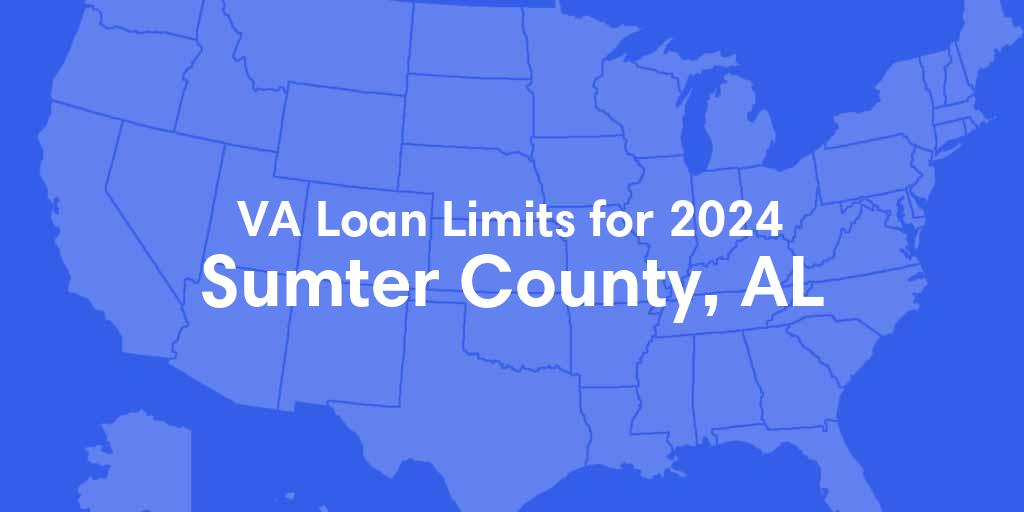Sumter County, AL VA Loan Limits for 2024

For 2024, VA loan limits in Sumter County, Alabama allow eligible veterans to buy a home with little to no down payment. Full entitlement means no set maximum limit. However, if you have partial entitlement or an existing VA loan, limits may apply and align with FHFA conforming loan limits.
Key Points About VA Loan Limits in Sumter County, Alabama:
- Full Entitlement: No maximum limit, potential for no down payment.
- Partial Entitlement: Limits may apply, matching FHFA conforming limits.
- Conforming Limits: In Sumter County, Alabama, limits for 2024 are $766,550 for single-family homes.
- High-Cost Areas: Limits may be higher in expensive areas.
Explore the 2024 loan limits for Sumter County, AL
| Number of Units | Loan Limits |
|---|---|
| One-Unit | $766,550 |
| Two-Unit | $981,500 |
| Three-Unit | $1,186,350 |
| Four-Unit | $1,474,400 |
Notes:
- One-Unit is a single-family home or condominium
- Two-Unit is two separate living units (duplex)
- Three-Unit is three separate living units (triplex)
- Four-Unit is four separate living units (fourplex)
What If You Exceed the Loan Limit?
If your loan exceeds the limit, a down payment may be needed. The amount depends on the difference between the home price and the limit.
VA loans provide flexible options for homebuyers in Sumter County, Alabama. Check your entitlement status and consult with a VA-approved lender for more details.
How to Find the Best VA Loan for property in Sumter County, AL
Follow this steps to explore current VA mortgage rates in Sumter County, AL personalized for property type: Single-Family Home, Condominium, Duplex, Triplex, or Fourplex.
- Select Loan Purpose
- Enter Property Zip Code
- Enter Purchase Price
- Enter Down Payment
- Select Your Credit Score
- Click "More Options" and select Property Type
- Click "Update Lenders" to filter personalized results
Current VA Loan mortgage rates for Sumter County, AL
Access free, detailed loan estimates from multiple lenders in one search. Compare and find the best offer — no obligations.
Unlock My Loan EstimatesPowered by SecureRights
VA loan limits are the maximum amounts that eligible veterans, service members, and certain other individuals can borrow through the VA loan program. These limits define the highest loan amount that the Department of Veterans Affairs guarantees for a no-down-payment mortgage.
VA loan limits are determined by the Federal Housing Finance Agency (FHFA) based on the conforming loan limits set for conventional mortgages. The VA typically matches these limits for loans with full entitlement.
Yes, VA loan limits vary by location and are typically aligned with the conforming loan limits. High-cost areas with higher home prices may have higher VA loan limits, allowing borrowers to access the VA loan program for more expensive properties.
While there are no specific maximum loan amounts for VA loans, the VA loan limits represent the maximum guarantee that the Department of Veterans Affairs provides. Borrowers can still obtain VA loans above these limits, but they may need to make a down payment to bridge the gap.
In most cases, VA loans offer 100% financing, allowing eligible borrowers to purchase a home without a down payment. However, if the loan amount exceeds the VA loan limit for a particular area, a down payment may be required to cover the difference.
Yes, you can use your VA entitlement to secure a VA loan even if the loan amount exceeds the VA loan limit. However, you may need to make a down payment for the portion of the loan that exceeds the limit.
You can find the VA loan limits for your area on the website of the Department of Veterans Affairs or by contacting your VA-approved lender. The VA's loan limit tool allows you to search for the limits based on your location.
Even if your desired loan amount exceeds the VA loan limit, using a VA loan can still offer benefits like competitive interest rates, no private mortgage insurance (PMI) requirement, and flexible qualification standards.
If you're looking to purchase a home that exceeds the VA loan limit, you can still do so with a VA loan. However, you may need to make a down payment for the portion of the purchase price that exceeds the limit.
Yes, VA loan limits can change from year to year based on factors like changes in home prices and loan limits set by the FHFA. It's important to stay updated on the current VA loan limits before applying for a VA loan.
A VA Loan is a mortgage program designed to provide eligible veterans, active-duty service members, and surviving spouses with affordable financing options for purchasing or refinancing a home.
Eligibility is typically based on military service and discharge status. Veterans, active-duty service members, and some surviving spouses may qualify.
Benefits include no down payment requirements, no private mortgage insurance (PMI), and potentially more favorable terms and interest rates.
No, VA Loans are intended for owner-occupied primary residences only.
VA Loans have more flexible credit score requirements, but a higher credit score can improve your chances of qualifying for the best terms.
Yes, the VA offers several refinancing options for eligible borrowers, such as the VA Interest Rate Reduction Refinance Loan (IRRRL) and cash-out refinance.
Yes, VA Loans may require a funding fee, which can vary based on factors like the borrower's military category, down payment, and whether it's a first-time or subsequent use of the benefit.
Eligible properties include single-family homes, condominiums, and some multi-unit properties, as long as one unit is owner-occupied.
Yes, the funding fee can be financed as part of the loan amount, allowing you to avoid an upfront out-of-pocket payment.
VA Loans require a VA appraisal to determine the property's value and assess its condition to ensure it meets VA's Minimum Property Requirements (MPRs).
Yes, you may be able to use your VA Loan entitlement multiple times, depending on your previous VA loan history and remaining entitlement.
Expect to provide proof of military service, income verification, and other standard documentation during the application process.
Closing costs can vary, but the VA has certain restrictions on the types of fees that veterans can pay, potentially reducing the overall cost.
VA Loans do not require a cosigner, as the borrower's income and creditworthiness are primarily considered during the underwriting process.
If you experience financial hardship, contact your loan servicer immediately to discuss available assistance options, such as loan modifications or forbearance.
